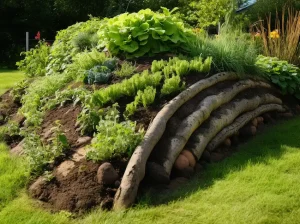Sepp Holzer, a renowned Austrian farmer and permaculture practitioner, is known for his pioneering work in agroforestry and ecological farming practices. He recommends steep hugel beds for several reasons:

1. Compaction Prevention:
Over time, traditional hugelkultur beds can suffer from soil compaction due to the pressure applied by gardeners and natural forces. Steep hugel beds minimize this issue as the steep slope prevents excessive foot traffic on the bed’s surface.
2. Increased Surface Area:
Steeper beds mean more surface area in your garden for planting. This increased planting space allows you to grow more crops and diversify your garden.
3. Easy Harvesting:
The height of steep hugel beds makes harvesting easier, as you don’t have to bend down as much. This ergonomic advantage can significantly reduce strain on your back and knees.
4. Improved Water Retention:
Like traditional hugelkultur beds, steep hugel beds excel at water retention. The organic materials within the bed act like sponges, soaking up moisture during rainy periods and gradually releasing it to the plants during dry spells. This can lead to reduced irrigation needs and increased drought resilience for your garden.









